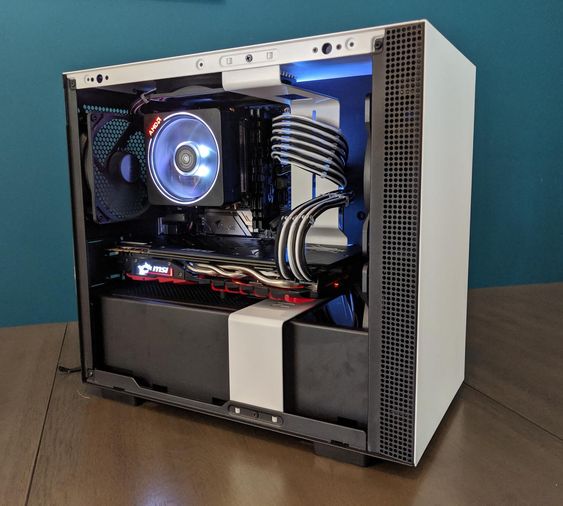Introduction
In the ever-evolving world of video games, the gaming PC stands as the ultimate platform for performance, customization, and visual fidelity. Gaming PCs offer unparalleled power and versatility, making them the preferred choice for serious gamers who seek top-tier performance, customizable setups, and access to the latest gaming technologies. Whether you’re a seasoned gamer looking to upgrade your rig or a newcomer building your first gaming PC, this comprehensive guide will help you understand what makes a gaming PC essential for an exceptional gaming experience.
Why a Gaming PC?
1. Superior Performance
Gaming PCs are designed to deliver high performance across the board. From faster processors and powerful graphics cards to large amounts of RAM and fast storage, gaming PCs can handle the latest AAA titles at the highest settings, ensuring smooth gameplay and stunning visuals. While consoles offer a decent experience, they can’t match the sheer power and flexibility of a dedicated gaming PC.
2. Customization and Upgradability
One of the main benefits of a gaming PC is the ability to customize and upgrade components. Unlike consoles, which come with fixed hardware, gaming PCs allow you to swap out parts like the CPU, GPU, or RAM as newer and better components become available. This future-proofing ensures that your system remains competitive even as technology advances.
3. High-Resolution Graphics and Frame Rates
Gaming PCs are capable of delivering much higher resolutions and frame rates compared to consoles. With the right hardware, you can experience games in 1440p or 4K resolution, at refresh rates beyond 60Hz, providing smoother, more engaging gameplay. For competitive gamers, a high frame rate can offer a significant edge, ensuring that the game responds to your inputs without any lag.
4. Access to a Vast Game Library
Another advantage of gaming PCs is access to an extensive library of games. While consoles have their exclusives, PCs offer an open platform with countless games available on platforms like Steam, Epic Games Store, and GOG. From indie gems to big-budget blockbusters, PC gamers enjoy a wider selection and frequently benefit from discounts and sales.
5. Multitasking and Productivity
A gaming PC isn’t just for gaming. With powerful hardware, a gaming PC can handle multitasking with ease, making it a great tool for work, content creation, and streaming. Many gamers use their rigs for video editing, 3D modeling, and other productivity tasks, maximizing the utility of their investment.
Key Components of a Gaming PC
When it comes to building or buying a gaming PC, the most critical aspect is understanding the core components that affect performance. Let’s break down the main parts and how they contribute to gaming performance:
1. Central Processing Unit (CPU)
The CPU, or processor, is the brain of your PC. It handles the general tasks your computer needs to perform, including running the game’s logic, handling AI, and managing inputs from your keyboard and mouse. A faster CPU can result in smoother gameplay, especially in CPU-intensive games like real-time strategy (RTS) games or open-world titles.
Considerations:
- Core Count and Clock Speed: A modern gaming CPU typically has at least 6-8 cores and a high clock speed (3.5 GHz or higher) to handle the demands of modern games.
- AMD vs. Intel: Both AMD and Intel offer excellent processors for gaming. AMD’s Ryzen series is known for multitasking and high core counts, while Intel’s Core series offers great single-threaded performance.
2. Graphics Processing Unit (GPU)
The GPU, or graphics card, is the most critical component for gaming. It’s responsible for rendering images, effects, and textures in real-time. A powerful GPU ensures that your games look great and run smoothly, especially at higher resolutions or when using advanced settings like ray tracing.
Considerations:
- VRAM: Video RAM (VRAM) is crucial for handling high-resolution textures and rendering detailed environments. For gaming at 1080p, 6-8GB of VRAM is sufficient, while 4K gaming may require 10GB or more.
- NVIDIA vs. AMD: NVIDIA’s GeForce and AMD’s Radeon GPUs dominate the market. NVIDIA is known for features like DLSS (Deep Learning Super Sampling) and ray tracing, while AMD offers excellent performance at a competitive price point.
3. Memory (RAM)
RAM allows your PC to store temporary data that games need to run smoothly. Insufficient RAM can result in stuttering and slow performance, especially in open-world or resource-heavy games. For gaming, having enough RAM ensures that your PC can quickly access the data needed for smooth gameplay.
Considerations:
- Capacity: For gaming, 16GB of RAM is generally considered the sweet spot, though some high-end games or multitasking scenarios may benefit from 32GB.
- Speed: RAM speed, measured in MHz, can also affect performance. Faster RAM can reduce load times and improve overall system responsiveness.
4. Storage
Gaming PCs benefit from fast storage solutions to reduce load times and improve system performance. The main types of storage are Hard Disk Drives (HDDs) and Solid State Drives (SSDs).
Considerations:
- SSD vs. HDD: SSDs are much faster than traditional HDDs, allowing for quicker load times, faster boot-up, and smoother overall performance. NVMe SSDs, which use the PCIe interface, are even faster than SATA SSDs.
- Capacity: Games are getting larger, so storage capacity is crucial. A 500GB to 1TB SSD is ideal for storing your operating system and a few frequently-played games, while an additional HDD can be used for bulk storage.
5. Power Supply Unit (PSU)
The PSU is responsible for delivering power to all components in your system. A high-quality PSU ensures that your gaming PC runs reliably, providing the necessary power without risking damage to your hardware.

